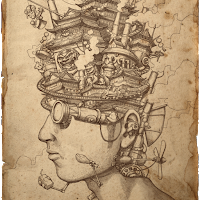[Edit: Follow-up post at https://ideatrash.net/2016/10/on-litmus-tests-and-invisible-illnesses.html]
I’m glad – and that’s not sarcasm, folks – to see people calling me out within hours of me asking people to.
In this case, it’s based around our current Kickstarter for Steampunk Universe. (I’m posting an abbreviated version of this post as a backer update as well; as I said in the post earlier today, I want to promote the idea that questioning and calling out behavior is appropriate.)
I’ve seen two sets of comments pop up recently – some in e-mail, some in twitter. Some directed at me, some not.
The first concern can be summed up in this tweet.
@steampunkpanda How many of your authors are disabled and/or neurodivergent for your Steampunk Universe Anthology? Can’t find this anywhere.— Tuttleturtle (@tuttleturtle42) October 19, 2016
The answer is “just under half”. This was – and is – a serious concern of ours that we asked fans and readers opinions of back in July.
While it would have been really cool to have 100% disabled or aneurotypical (or neurodivergent or neuroatypical) authors, after two years of soliciting stories, that simply isn’t what we ended up with. We had a choice between doing a good job of increasing representation of characters … or throwing in the towel and doing nothing.
Some of the comments we got from potential readers were very powerful. The one that moved me the most was this: “As for me, as a reader, I can tell you that I suffer from an extreme case of obsessive compulsive disorder, BPD and depression, and I am always, always reading novels, short stories and poetry that speaks to me, that tells my story. I crave that solidarity with the character. But never have I been concerned whether or not the writer is disabled or suffers from a mental illness themselves. So long as their story is engaging, and their characters real and represent the true side of what I live through, I am more than happy to read their words.”
So we forged ahead. As with Steampunk World, we hope that Steampunk Universe will help create more diversity in both steampunk and other areas of fiction, even if (as far as we knew) not all the authors were personally disabled or aneurotypical.
This is important, because the first “behind the story” I shared today had this line in it: “Disability is such a hard thing to quantify; I’m not disabled, yet I have things that stand in the way of my everyday life, and I really wanted to get that across.”
This public comment sums up the second issue, so I’ll quote it as representative:
@DisVisibility A non-disabled writer seems to be under the impression she can simulate a disabled experience because “things get in her way”— D. Morgenstern (@sieistschoen) October 19, 2016
I hear you.
First, the responsibility of this falls on me. I (Steven) solicited these “behind the story” essays, and I’m also the one who solely edited and approved them. (And I did do some rewording with this one.)
Now that I’ve been (figuratively) smacked upside the head – and thank you for that! – I realize how that language came across to a number of people. I realize that it came across as minimizing both disabled people and minimizing the disability itself.
I apologize. To minimize you – any of you – is exactly the opposite of the intent of anyone involved in this project.
I can explain how I understood that sentence.
When I read that sentence, I thought of when I was stationed in Korea. When a cab refused to pick me up, because I was a white American. When I was denied entrance to a club, again, because the sign said “NO GIs”.
These are trivial complaints, and they’re things that I can simply walk away from.
They’re also one of the few times in my life (thanks to being straight, white, middle class, and American) I’ve experienced something like the actual racism and bigotry so many others have to deal with on a regular basis.
Let me emphasize: My experiences do not compare. Not even a little.
But they do give me a little window where I can start to empathize. And that empathy is the beginning of being able to write characters outside of my own experience.
I check, of course. I’ve asked people that belong to specific demographic groups to read my work, to ensure that my empathy hasn’t become projection, that my empathy is giving me just enough insight to be able to provide the emotional context for my characters.
And that is how I understood that sentence’s intent. I understood the intent as an able-bodied writer seeking to try to empathize through the closest experiences she could find, in order to create a character and story that was as authentic as possible, to make “their characters real and represent the true side of what [others] live through.”
Regardless, that does not change how it came across. And again, I take responsibility and apologize.
I’ve been thinking for most of the day how to better communicate this idea: That we, as authors, seek something with a close emotional resonance or feeling in order to empathize and communicate the worlds of others that we might not be a part of…but to do so in a way that doesn’t unintentionally convey a disregard or minimizing of others.
While I don’t have any answers yet, I am not giving up. (If you have any suggestions, they’re very welcome.)
I hope that explaining the intent in that backer update – as well as taking this critique seriously – communicates all of our seriousness and passion for this project and everything it stands for.
If you have not yet backed the project, you can find it at steampunkuniverse.alliterationink.com

